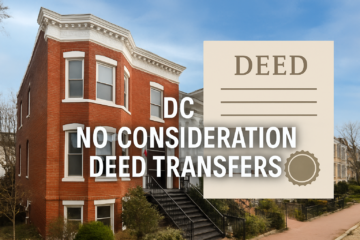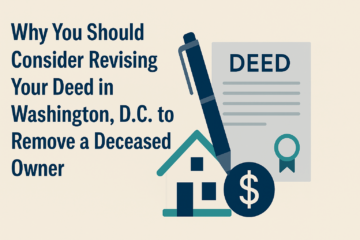Preparing a deed might seem like a daunting task, especially if you’re a Maryland resident tackling it for the first time. But fear not! In this guide, we’ll break down the process of deed preparation into simple, digestible steps. Our guide to navigating deed preparation can save you both time and stress.
Understanding Deed Basics
Before diving into drafting a deed, it’s essential to grasp the key elements involved. A deed is a legal document that transfers property ownership from one party to another. In Maryland, there are various types of deeds, such as the quitclaim, warranty, and special warranty deeds, each serving a unique purpose in property transactions.
Understanding the types of deeds used in Maryland helps in knowing what suits your situation best. Quitclaim deeds, for instance, offer no warranties and are generally used among trusted parties, like family members. In contrast, warranty deeds provide more protection by assuring the grantee that the title is free from any encumbrances.
Key Documents Needed for Navigating Deed Preparation
Preparing a deed requires certain documents to ensure accuracy and legality. Essential documents include the previous deed, a legal description of the property, and any existing liens or encumbrances. Collecting these documents ahead of time will simplify the deed preparation process.
A legal description of the property, often found in the existing deed, is crucial for deed preparation. This description provides precise boundaries and measurements of the property, distinguishing it from any other parcel of land. Additionally, understanding if the property is under a semi-annual ground rent or is held in ‘fee simple’ can clarify any financial obligations tied to the property ownership.
When gathering documents, it’s also wise to check the property’s current tax status. Confirming your homestead status with the county can protect your property tax benefits. This is especially crucial after a deed transfer to avoid unexpected financial liabilities.
Step-By-Step Guide to Drafting a Deed
Once you have your documents ready, the next step is to draft your deed. This involves clearly identifying the parties involved, providing an accurate property description, and specifying the type of deed being used. Attention to detail is crucial to avoid any legal issues.
Begin by naming the grantor, or the person transferring the property, and the grantee, the new owner receiving the property rights. Following this, include the legal property description and ensure it matches exactly with the one on record. When adding a name to the deed, remember that the process involves risks such as triggering transfer taxes if not properly managed.
It’s essential to outline the type of ownership transfer being executed, as this can affect the legal standing and financial implications of the deal. For example, ‘tenancy by the entirety’ is often used for married couples, providing rights of survivorship that aren’t present in other forms of ownership.
Filing and Recording Your Deed
After drafting the deed, it must be signed and notarized. The final step is to file it with the appropriate county office. In Maryland, deeds are typically recorded with the Land Records Department of the local Circuit Court. Correctly filing your deed is vital for maintaining clear property titles.
When recording the deed, ensure it’s notarized as a valid document and signed by all required parties. This step provides legal notice to the public and protects the grantee’s interests by preventing subsequent claims against the property. Additionally, the process of recording may involve fees, so be prepared to address these costs for a seamless recording experience.
When to Consult a Professional
While many Maryland residents can handle basic deed preparation, some situations require professional guidance. Complex transactions, such as those involving trusts or corporations, might benefit from a real estate attorney’s expertise to ensure compliance with all legal requirements.
Engaging with a Maryland real estate lawyer when navigating FSBO contracts or other intricate dealings can ease the burden of understanding nuanced legal language. Professionals also offer assurance by addressing potential pitfalls thoroughly, thus fortifying your legal and financial interests.
Wrapping Up Your Deed Preparation Journey
Navigating the deed preparation process doesn’t have to be intimidating. By understanding the basics, gathering the necessary documents, and knowing when to seek professional help, you can confidently manage your property transactions. With this knowledge in hand, Maryland residents can ensure their deeds are prepared accurately and efficiently.




0 Comments